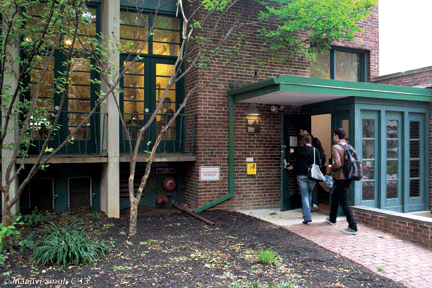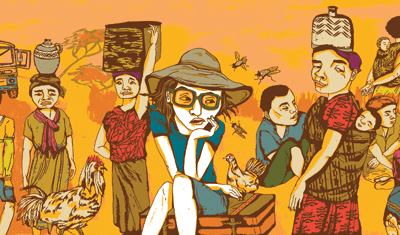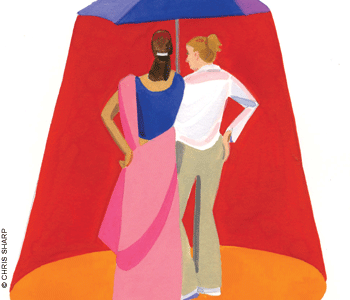
Ten years ago last month, Penn’s Graduate Student Center opened at 3615 Locust Walk, in the building that once housed Phi Sigma Kappa fraternity. Under the watchful eye of Anita Mastroieni GGS’99 GrEd’10, the center’s director, it quickly became the locus of activity for Penn’s 11,000 grad students, and its activities and programs have swelled accordingly. Senior editor Samuel Hughes recently spoke with Mastroieni about what the center has been up to for the past decade, and where it’s going.
Before the Graduate Student Center opened, you noted that there had been “no sense of graduate community.” How much has the center changed that? Was the change immediate or did it take a while?
We’ve given grad students a place to gather, meet, and engage with each other, and a way to participate together in activities. Having the building, the gathering place, is key. Students need a space to come together. For as much as society touts “virtual communities,” it’s just not the same.
The thing about graduate education is, it’s completely department-focused. So unless you give grad students a structural way to come together, you run the risk of them never leaving their departments, never meeting other students, never having a really “full” experience at Penn.
Some of the Grad Center’s impact was immediately apparent—students were hanging out in the space, drinking the free coffee, from day one. But some aspects have grown slowly over time. New Student Orientation, for example. When we first ran Grad NSO, just a few dozen students attended our events. Now we see several thousand new students each NSO.
Apart from that sense of community, and providing an attractive physical home for grad students, what are its most important functions?
We run a lot of activities—more than 200 a year—for grad students. Some of the activities provide academic support, like our Navigating Series for PhD students. Some help students develop [practical] skills, like our home-buying workshops. And some are just fun, like hiking trips or game nights. All of our events are planned by our Grad Fellows—grad students know best what other grad students want to attend—and that’s part of our success. We’ve also turned over the entire activities budget to our fellows, because nobody can pinch a penny like a grad student.
We also provide a lot of information about resources for students so they can be successful at Penn. If you’re completely stressed out writing your dissertation, it might not be really obvious that if you go to CAPS [Counseling and Psychological Services], you’ll find a support group just for stressed-out dissertators. We make it our business to know all that info so students can get quick and easy answers from us.
How much of an enticement for potential grad students is a space like that? Have you had much feedback?
That’s really hard to measure. Not a lot of universities have Grad Centers, so I’m not sure it’s even on most students’ radar. It’s my sense that when students choose Penn for grad school, our Grad Center is a pleasant surprise. Having said that, I know that our students who interact with students from other grad schools often come back feeling fortunate to be at Penn.
A few years ago, we had a grad fellow who was married, and when he was finishing up his PhD here at Penn, his wife got accepted to Columbia. After she started her program, she was appalled to learn that Columbia didn’t have a grad center. She had hung out at our center so much with her husband, it just never occurred to her that this didn’t exist on every campus. So she got involved with the grad-student government at Columbia, and started lobbying for a grad center, and kept at it for several years. And just last year Columbia announced that it will open a graduate student center. So I feel quite proud that because of our work here at Penn, students at Columbia are benefitting.
Given the broad range of disciplines and schools Penn’s grad students represent, I would assume the center would make for some lively cross-pollination, both professionally and personally. Any notable examples?
Our Language Chats Program is one of the prime ways we see that happen. We offer chats in Japanese, Chinese, English, Spanish, etc. Students who speak the language volunteer to lead the chats. Some students come to chats because they’re homesick and want to hear their native language. Some come because they’re doing research in another country and need to strengthen their skills. Some come just to brush up on a rusty second language. But in any case, they’re all there from different disciplines and end up discussing their research, as well as their families and their problems and their goals. The Chats Program is terrific because it’s a great way to meet other students you wouldn’t normally ever interact with.
Any programs or other developments you’re particularly proud of?
Two come to mind. We created a great program called Dissertation Boot Camp. It’s so simple, really. We take 24 or so students who are struggling to finish their dissertations, put them in a big room together, give them snacks, and tell them they have to write at least four hours a day for two weeks. Oh, and we get enormous help from the Weingarten Learning Resources Center—they give a workshop and one-on-one advising sessions, which the students find really valuable. Writing that dissertation is probably the most solitary thing a student will ever do. It’s just plain lonely. So having the students working in each other’s company makes it so much more palatable. Many other universities have consulted with us because they’ve heard our program is so successful—Yale, Princeton, Stanford, we’ve helped them set up boot camps for their own students.
The other program I’m very proud of has developed into a whole new center: the Family Resource Center for students and post-docs with children. Students with children had asked us to run activities just for them. We started out just doing monthly play dates, but it became very apparent that there was a lot of need among this population. Eventually, we wrote a proposal to open a separate center for this audience (based on a very successful Family Center at the University of Chicago). To our delight, the Provost’s Office quickly approved the idea. So now we run that center too.
Anything else you want to say?
The Grad Center would make a great TV show. We have such an incredibly interesting assortment of students that we see every day: the buttoned-up, professional law and MBA students, the harried med students, the wonky PhDs, the idealistic social workers, the engineers, the anthropologists, the scientists. And unlike those TV shows based on high school, our students don’t have to graduate in four years! Some could stay on the show indefinitely!




